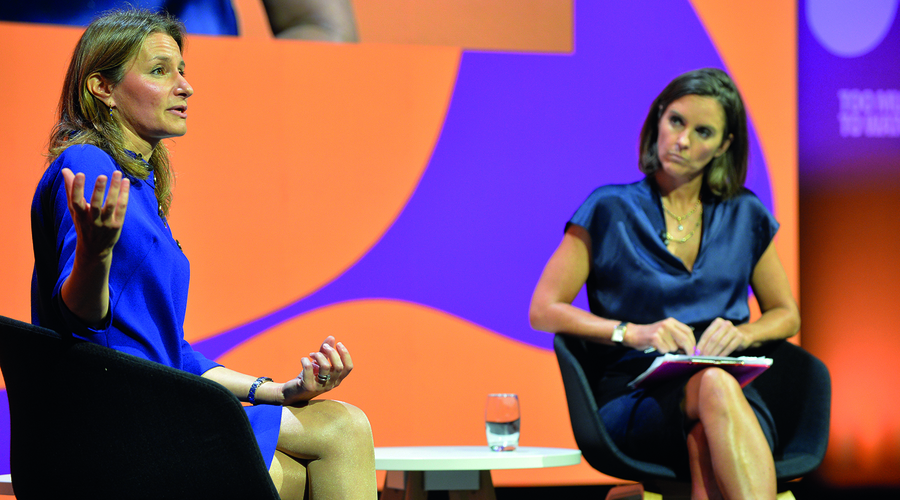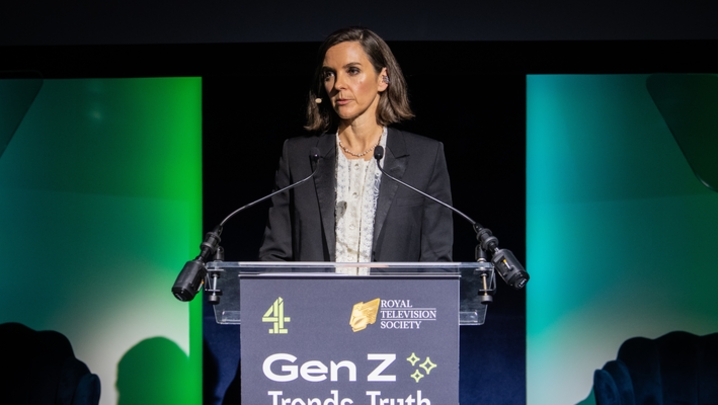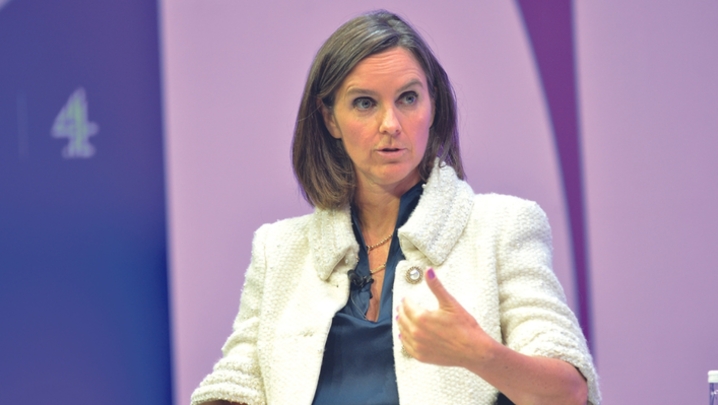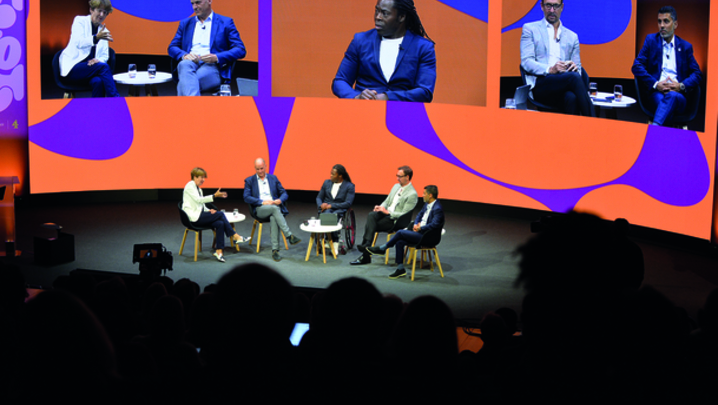Lucy Frazer, Secretary of State for Culture, Media and Sport, addresses the future of TV against a background of change
Broadcasters, production companies and streamers must ensure “this industry is synonymous with talent, opportunity and inclusivity, and not the scandals of #MeToo”.
In a wide-ranging speech that brought a personal touch to the convention, Lucy Frazer, who was appointed culture secretary in February, insisted: “TV studios, production facilities and offices need to be places where people feel safe. Places where working cultures are responsible and accountable, and do not allow for possible abuses of power. Places where everyone feels able to speak up, no matter how junior, and where leaders never turn a blind eye.”
She was, of course, speaking days after a joint investigation by Channel 4, The Times and The Sunday Times had alleged that Russell Brand had raped, sexually assaulted and emotionally abused women during the height of his fame as a TV and radio presenter at the BBC and Channel 4 between 2006 and 2013. Brand had denied all allegations.
Striking an empathetic note throughout, Frazer began by recalling how, as a seven-year-old, she had fantasised about starring in her own TV show. “After school I watched Tony Hart transform Morph on my screen and imagined my future on the TV. The fact that I was absolutely hopeless at art never appeared to me to be a barrier to my prospective career,” she said.
She discarded her dream of working in TV when she started reading for a law degree, but told the convention that, had she tried to forge a career in TV, she would have been working in a world-leading sector.
“Today, in 2023, we produce the best of the best,” she continued, listing some of the memorable programmes that have been produced, filmed and written in the UK, such as Sex Education, The Crown and Luther.
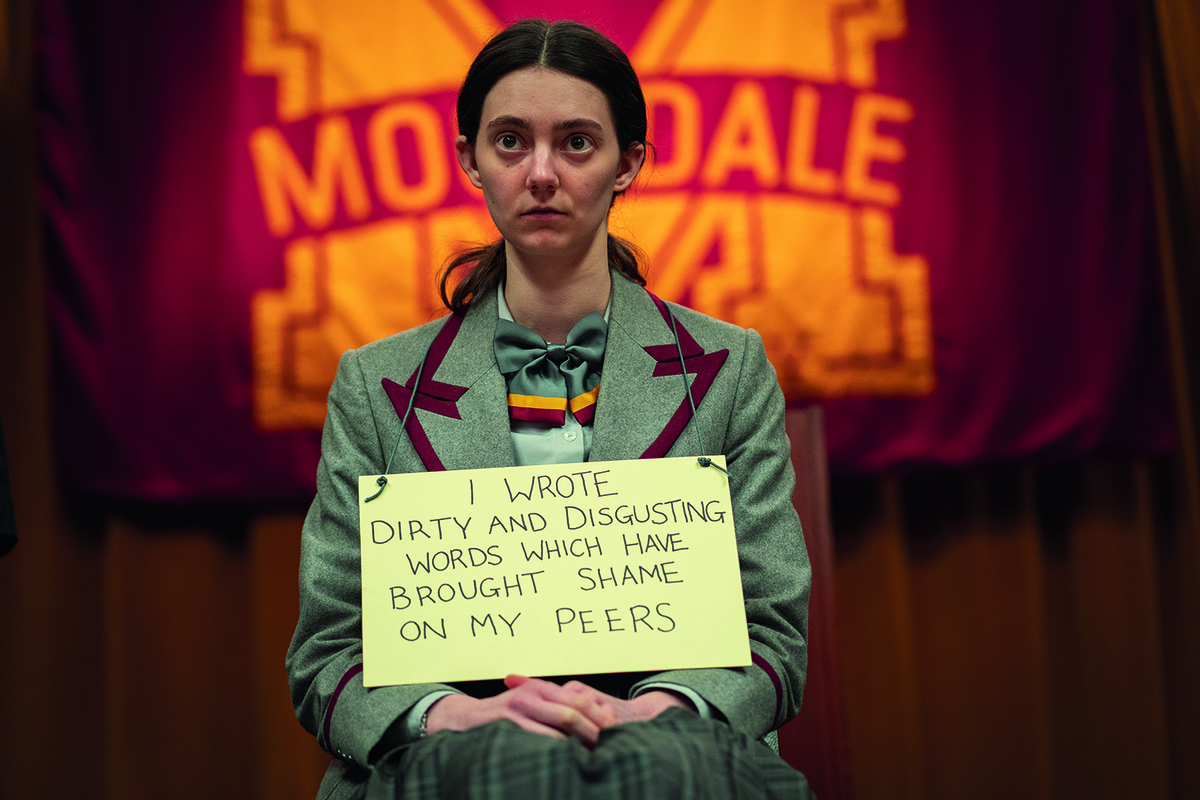
“And with imitation being the sincerest form of flattery, many of our great TV shows and formats have spawned remakes all over the world – from Love Island and The Office to Bake Off and Ghosts,” said Frazer.
She added: “Our PSBs have been able to bring the same levels of creativity to their programming as do streaming services backed by some of the biggest businesses in the world.
“You see this in countless programmes, from Happy Valley and Unforgotten to Taskmaster and Derry Girls.” As for her own viewing habits, the minister was enjoying Ted Lasso.
“But despite this excellence, it would be foolish to ignore the enormous challenges that you all face in remaining competitive,” Frazer warned.
“The Government is committed to our film and high-end TV sector, and we want to ensure that it is in the best possible position to bounce back once the US strikes are resolved,” she said.
Ofcom’s research had highlighted the seismic scale of change. The number of TV programmes attracting 4 million or more viewers had halved since 2014. News shows and soaps were seeing steep declines in viewer numbers across the board.
“They show that TikTok, for the second year in a row, was the fastest-growing source of news in the UK.”
Meanwhile, artificial intelligence was beginning to transform the way content was consumed and created.
“The Government has an interest in this – because your success is success for our economy, with the jobs and growth you support – and your success is also success for our society because the content you create helps to entertain, challenge, console and educate,” said Frazer.
She saw her role as threefold: maximising the growth potential of the creative industries; supporting the TV business to navigate this changing world; and ensuring that media freedoms were championed.
The culture secretary said she was determined that the UK remain an attractive place for global content producers: “In February, I worked with the Chancellor to ensure we not only continue the High-End TV Tax Relief and other creative tax reliefs, but actually increase them, in the form of the new Audio-Visual Expenditure Credit.
“In June, I published our Sector Vision – which is a collaboration with the industry – in particular, the Creative Industries Council. This vision set out our ambition for the creative industries as a whole – to grow the sector by £50bn, create a million new jobs and a pipeline of talent, all by 2030.”
"We need to ensure that what we create stays here and the value we create stays here"
Creative Industries Clusters across the country – TV in Leeds and gaming in Dundee and Bristol – were being invested in. And she had recently announced a collaboration between the National Film and Television School, Royal Holloway, University of London and Pinewood Studios for the development of green screens.
During the pandemic, the £1.5bn Culture Recovery Fund and the Film and TV Restart Scheme had supported more than 100,000 jobs for cast and crew on at least 1,000 productions.
The Media Bill was being brought forward and would update the system in which public service broadcasters operate, future-proof it and level the playing field. “It does this by making sure public service broadcasters’ apps such as BBC iPlayer, ITVX, STV Player, the Channel 4 app, My5 and S4C’s Clic are always easy to find and watch, whether you’re on a smart TV or using a streaming stick,” said the minister.
Frazer continued: “The bill is about ensuring we have the right playing field in place for all parts of the TV ecosystem to thrive. This is part of our work to help bring TV into the digital age, but we recognise there is more to do – because we recognise that internet-provided TV is growing.
“Free-to-view television is a vitally important part of our television landscape, and this Government wants to encourage the sector to keep embracing innovation and technological development, but we’re not going to pull the rug from under the devoted audiences of Freeview channels.
“We want terrestrial television to remain accessible for the foreseeable future. Today, I can confirm that we’re launching a new programme of work on the future of TV distribution, alongside a call for evidence from Ofcom – which it will publish later in the autumn.
“My department will undertake a six-month research project, looking at changing viewing habits and technologies that will impact how shows are brought to our screen, both now and in the decades to come – acknowledging, always, the importance of access.”
She added: “We are also working within my department, with industry and with Ofcom, to consider the impact of specific new technologies such as AI and to shape an evidence base that can guide future policymaking.”
In this context, it was vital to “protect and maintain the integrity of our high-quality news output” and, in the coming weeks, her department would be hosting several roundtables on AI to discuss its implications for the media and the creative industries.
“Finally, this is all so important because your work retains and enhances our media freedom,” she said. “Media freedom is central to our values as a country, and to mine as your culture secretary.”
In Session Eight, ‘Secretary of State keynote’, the Rt Hon Lucy Frazer KC, Secretary of State for Culture, Media and Sport, was interviewed by Alex Mahon. The producer was Sue Roberston. Report by Steve Clarke.

